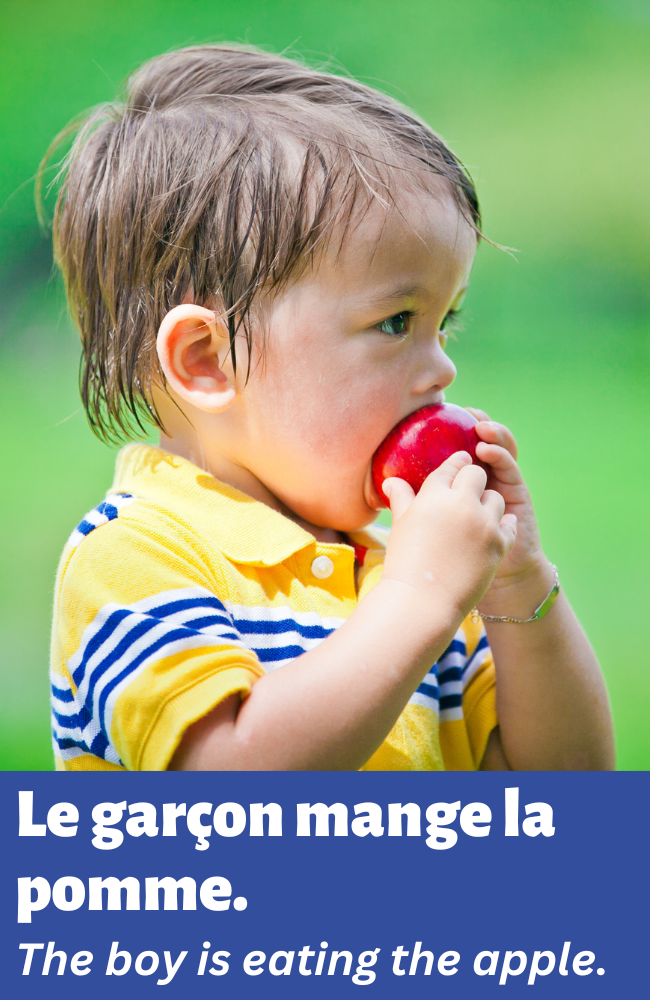The conjugation of manger (meaning: to eat; pronunciation mɑ̃ʒe) is je mange (I eat), tu manges (you eat), il/elle mange (he/she eats), nous mangeons (we eat), vous mangez (you eat), ils/elles mangent (they eat). In this post we’ll provide conjugation charts for manger in six major verb tenses.

Manger is a regular -er verb. The means that its endings in the present tense are the same as all other regular verbs which have infinitives ending in -er. The endings are: -e, -es, -e, -ons, -ez, and -ent.
The past participle of manger is mangé, meaning “ate”.
There is a slight irregularity in the first-person plural (nous) form where an extra -e is added. We’ll explain more below.
The verb tenses covered on this page include:
- Present (le présent)
- Le passé composé
- Imperfect (l’imparfait)
- Simple future (le futur simple)
- Conditional (le conditionnel)
- Subjunctive (le subjonctif)
Manger conjugation verb table
The following is a verb conjugation table of manger in six tenses. Further down the page we’ve provided complete conjugation chart including example sentences.

Manger conjugation charts
The following section provides full conjugation charts for manger with example sentences. These charts make use of French food vocabulary.
Present tense
In the present tense (le présent), je mange translates to both “I eat” and “I am eating”.
Note a particularity about manger when conjugated in the present tense. An extra -e is inserted in the first-person plural (nous) form after the -g (mangeons) to make a soft -g sound.
This pronunciation rule is covered on our French reading rules page.
| Je mange | I eat | Je mange la pizza. | I'm eating the pizza. |
| Tu manges | You eat (familiar, singular) | Tu manges le fromage. | You eat the pizza. |
| Il/elle mange | He/she eats | Il mange le poisson. | He's eating the fish. |
| Nous mangeons | We eat | Nous mangeons le filet mignon. | We're eating the filet mignon. |
| Vous mangez | You eat (formal, plural) | Vous mangez le poulet et le riz. | You are eating the chicken and the rice. |
| Ils/elles mangent | They eat | Ils mangent la glace au chocolat. | They're eating the chocolate ice cream. |
Passé composé
The passé composé is commonly used French past tense used to express completed events. In the first-person singular (je) form, j’ai mangé means “I ate”. The past participle of manger is mangé.
| J'ai mangé | I ate | J'ai mangé toute la pizza. | I ate the entire pizza. |
| Tu as mangé | You ate (familiar, singular) | Tu as mangé une salade verte. | You ate a green salad. |
| Il/elle a mangé | He/she ate | Elle a mangé tous les biscuits. | She ate all the cookies. |
| Nous avons mangé | We ate | Nous avons mangé un gâteau au chocolat. | We ate a chocolate cake. |
| Vous avez mangé | You ate (formal, plural) | Vous avez mangé les saucisson. | You ate the dried saussage. |
| Ils/elles ont mangé | They ate | Ils ont mangé le le bifsteck d’alouyau. | They ate the sirloin steak. |
Imperfect
The French use the imperfect tense (l’imparfait) to express actions which occurred at unspecified times. Je mangeais translates to “I used to eat” and “I was eating”.
| Je mangeais | I used to eat, was eating | Avant, je mangeais trop de sucre. | Before, I used to each too much sugar. |
| Tu mangeais | You used to eat, were eating (familiar, singular) | Qu'est-ce que tu mangeais quand tu étais un enfant? | What did you used to eat when you were a child? |
| Il/elle mangeait | He used to eat, was eating | Il mangeait quand quelqu'un a frappé à la porte. | He was eating when somebody knocked on the door. |
| Nous mangions | We used to eat, were eating | Nous mangions beaucoup de pizza à l'université. | We used to eat a lot of pizza in college. |
| Vous mangiez | You used to eat, were eating (formal, plural) | Vous mangiez à la cantine au collège. | You used to eat at the cafeteria in middle school. |
| Ils/elles mangeaient | They were eating, used to eat | Avant, ils mangeaient trop de glucide. | Before, they used to eat too many carbohydrates. |

Future tense
In the future tense (le futur simple), je mangerai translates to “I will eat”.
| Je mangerai | I will eat | Je mangerai beaucoup de fromage en France. | I will eat a lot of cheese in France. |
| Tu mangeras | You will eat (familiar, singular) | Tu mangeras beaucoup de pizza en Italie. | You will eat a lot of pizza in Italy. |
| Il/elle mangera | He/she will eat | Est-ce qu'elle mangera avec nous? | Will she eat with us? |
| Nous mangerons | We will eat | Nous ne mangerons pas avant midi. | We will not eat before noon. |
| Vous mangerez | You will eat (formal, plural) | Vous mangerez chez vos amis ce soir. | You will eat at your friends' house tonight. |
| Ils/elles mangeront | They will eat | Ils mangeront bien en Europe. | They will eat well in Europe. |
Conditional tense
The French use the conditional tense (le conditionnel) to express hypothetical events which “would” occur. Je mangerais translates to “I would eat”.
| Je mangerais | I would eat | Je mangerais mais je n'ai pas faim. | I would eat but I'm not hungry. |
| Tu mangerais | You would eat (informal, singular) | Tu mangerais si tu avais faim. | You would it if you were hungry. |
| Il/elle mangerait | He/she would eat | Elle mangerait si elle se sentait mieux. | She would eat if she felt better. |
| Nous mangerions | We would eat | Nous mangerions si nous avions assez de temps. | We would eat if we had enough time. |
| Vous mangeriez | You would eat (formal, plural) | Vous mangeriez si vous aviez faim. | You would eat if you were hungry. |
| Ils/elles mangeraient | They would eat | Ils mangeraient si ils avaient une reservation. | They would eat if they had a reservation. |
Subjunctive
The French use the subjunctive mood (le subjonctif) to express wishes, emotions and doubts. Que je mange translates to “that I eat”.
| que je mange | that I eat | Il faut que mange avant de partir. | I need to eat before leaving. |
| que tu manges | that you eat (familiar, singular) | Je veux que tu manges quelque chose. | I want you to eat something. |
| qu'il/elle mange | that he/she eats | Je doute qu'elle mange les légumes. | I doubt she's eating the vegetables. |
| que nous mangions | that we eat | Elle est heureuse que nous mangions le poisson. | She's happy we're eating the fish. |
| que vous mangiez | that you eat (formal, plural) | Ils faut que vous mangiez le fromage. | You need to eat the cheese. |
| qu'ils/elles mangent | that they eat | Je ne sais pas s'ils mangent avec nous. | I don't know if they're eating with us. |

Help learning French verbs
Learning French verbs can be very difficult. We’ve known Camille at Frenchtoday.com for many years. Camille suggest to focus more on mastering the pronunciation of verbs. She elaborates on this top in this blog post.
More verb conjugation tables on our site:
- parler (to speak)
- aimer (to like, to love)
- être (to be)
- avoir (to have)
- aller (to go)
- faire (to make, to do)
- venir (to come)
- vouloir (to want)
- pouvoir (can, to be able)
- devoir (must, have to)
- prendre (to take)
- boire (to drink)



